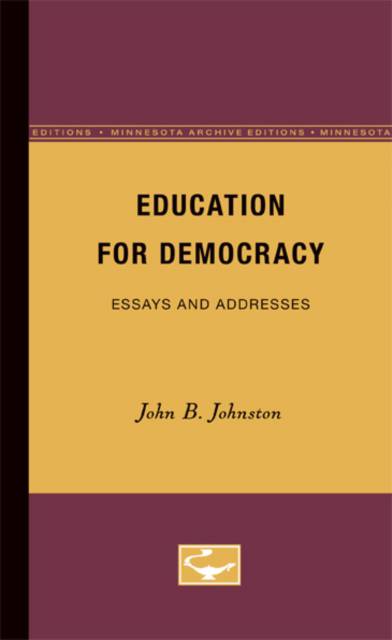
- Afhalen na 1 uur in een winkel met voorraad
- Gratis thuislevering in België vanaf € 30
- Ruim aanbod met 7 miljoen producten
- Afhalen na 1 uur in een winkel met voorraad
- Gratis thuislevering in België vanaf € 30
- Ruim aanbod met 7 miljoen producten
Zoeken
Omschrijving
Education for Democracy was first published in 1934. Minnesota Archive Editions uses digital technology to make long-unavailable books once again accessible, and are published unaltered from the original University of Minnesota Press editions."The Greek ideal of the citizen realizing himself in the state" is the heart of Dean Johnston's philosophy developed in this book. He is concerned not merely with education, but with our current economic, political, social, and ethical problems, which education directed toward service to the state may help to solve.This is a book in which an ideal rather than a theory of education is clearly stated at the beginning, and developed like a theme in music. The author, speaking from a long and varied experience as scientist, teacher, and college administrator, sees the only hope of a future democratic state in the selection and training of competent and unselfish leaders.This selection, he firmly believes, is the task of the schools and especially of the colleges. By "selection" he means - he is careful to point out - not the exclusion of any capable person from higher education, but a careful fitting of every individual for the occupation in which he will be most happy and will render the best service to society.The papers collected here all deal with some variation of this theme. They draw up a striking indictment of many current educational practices, while pointing the way, as this prominent educator sees it, toward the alleviation of that "social manic-depressive insanity" with which our civilization is now afflicted.
Specificaties
Betrokkenen
- Auteur(s):
- Uitgeverij:
Inhoud
- Aantal bladzijden:
- 288
- Taal:
- Engels
Eigenschappen
- Productcode (EAN):
- 9780816671649
- Verschijningsdatum:
- 1/01/1934
- Uitvoering:
- Paperback
- Formaat:
- Trade paperback (VS)
- Afmetingen:
- 127 mm x 203 mm
- Gewicht:
- 290 g

Alleen bij Standaard Boekhandel
+ 169 punten op je klantenkaart van Standaard Boekhandel
Beoordelingen
We publiceren alleen reviews die voldoen aan de voorwaarden voor reviews. Bekijk onze voorwaarden voor reviews.











